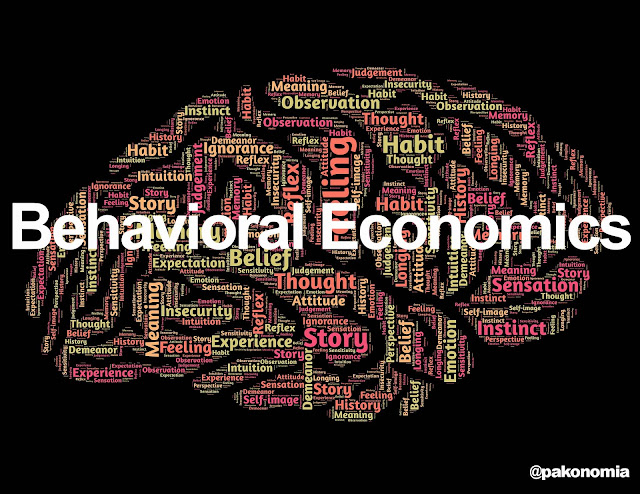Behavioral Economics
Behavioral Economics is a new field of study or branch in economics. It especially deals with the question of the human decision-making process.
Behavioral Economics applies psychological methods to get insights and useful understanding of human behavior and their decisions choices and preferences.
As human behavior is the focal point of study in economics, it analyses choices and preferences of economic agents i.e., consumers and producers. Behavioral economics, on the other hand, provides better ways to help individuals make better choices and preferences.
Behavioral economics is based on the fact that humans are not rational and make poor choices. The theories we study in behavioral are developed to help individuals and policymakers to make better decisions and choices.
Behavioral Economics differs from Traditional Economics
The traditional economics assumes that all economic agents are rational and takes into account all available information. The economic agents perfectly perform cost and benefit analysis between alternative choices.
Behavioral economics seeks to explain that all humans are not rational and have no access to complete information. Their decision is based on their emotional responses and affected by their environment i.e., social and cultural factors.
The second assumption of traditional economics is that economic agents' decisions are based purely on their self-interest. in other words, they are selfish creatures (Homo economicus) and are motivated by their own wellbeing.
Behavioral Economics challenged this assumption of economics and argued that all decisions and behaviors are not influenced by the desire to maximize one's own interests, rather other social and psychological factors are in play.
Predictably Irrational is a book by Dan Ariely, a behavioral economist, in which he challenged the assumption of making rational decisions. This book was published in 2008 in an attempt to better understand human behavior and decisions.
In Predictably Irrational, Dan Ariely challenged the rational choice theory and its assumptions. He advocated his arguments by taking and analyzing examples from real life that proved more authentic and insightful.
Richard Thaler is another behavioral economist, who also won Nobel prize for his outstanding contribution in the field of behavioral economics. He won this Nobel prize for explaining how irrational human choices and decisions are.
Richard Thaler wrote a book, Nudge: Improving Decisions About Health, Wealth And Happiness, in which he presented his theory to help individuals and policymakers in making rational decisions and choices. He said that human makes poor choices humorously and every now and then.
In Misbehaving: The Making of Behavioral Economics, Richard Thaler was successful in getting the behavioral economics recognized worldwide. In this book, he satirically referred to the rational and logical choices as predicted by traditional economists.
Behavioral Economics is a deviation from traditional economics in the sense that it takes into account actual human behaviors. Humans have been regarded as Emotional Animals rather than rational animals. Their particular environment and their mental processes that shape their decisions are worth taking into account to better understand the decision-making of economic agents.
The second assumption of traditional economics is that economic agents' decisions are based purely on their self-interest. in other words, they are selfish creatures (Homo economicus) and are motivated by their own wellbeing.
Behavioral Economics challenged this assumption of economics and argued that all decisions and behaviors are not influenced by the desire to maximize one's own interests, rather other social and psychological factors are in play.
Kahneman' Prospect Theory and Behavioral Economics
Daniel Kahneman and Amos Tversky challenged the basic assumption of expected utility theory and presented his theory of Prospect Theory. This theory is considered the foundation stone of all behavioral economics theories.
Daniel Kahneman was awarded the Nobel prize for his outstanding achievement in the field of economics for presenting the prospect theory.
Prospect theory explains that human choices or preferences are not absolute while doing a cost-benefit analysis. Rather, their choices are preferences are relative in different situations.
Predictably Irrational and Behavioral Economics
Predictably Irrational is a book by Dan Ariely, a behavioral economist, in which he challenged the assumption of making rational decisions. This book was published in 2008 in an attempt to better understand human behavior and decisions.
In Predictably Irrational, Dan Ariely challenged the rational choice theory and its assumptions. He advocated his arguments by taking and analyzing examples from real life that proved more authentic and insightful.
Richard Thaler and Behavioral Economics
Richard Thaler is another behavioral economist, who also won Nobel prize for his outstanding contribution in the field of behavioral economics. He won this Nobel prize for explaining how irrational human choices and decisions are.
Richard Thaler wrote a book, Nudge: Improving Decisions About Health, Wealth And Happiness, in which he presented his theory to help individuals and policymakers in making rational decisions and choices. He said that human makes poor choices humorously and every now and then.
In Misbehaving: The Making of Behavioral Economics, Richard Thaler was successful in getting the behavioral economics recognized worldwide. In this book, he satirically referred to the rational and logical choices as predicted by traditional economists.
Behavioral Economics is a deviation from traditional economics in the sense that it takes into account actual human behaviors. Humans have been regarded as Emotional Animals rather than rational animals. Their particular environment and their mental processes that shape their decisions are worth taking into account to better understand the decision-making of economic agents.





0 Comments